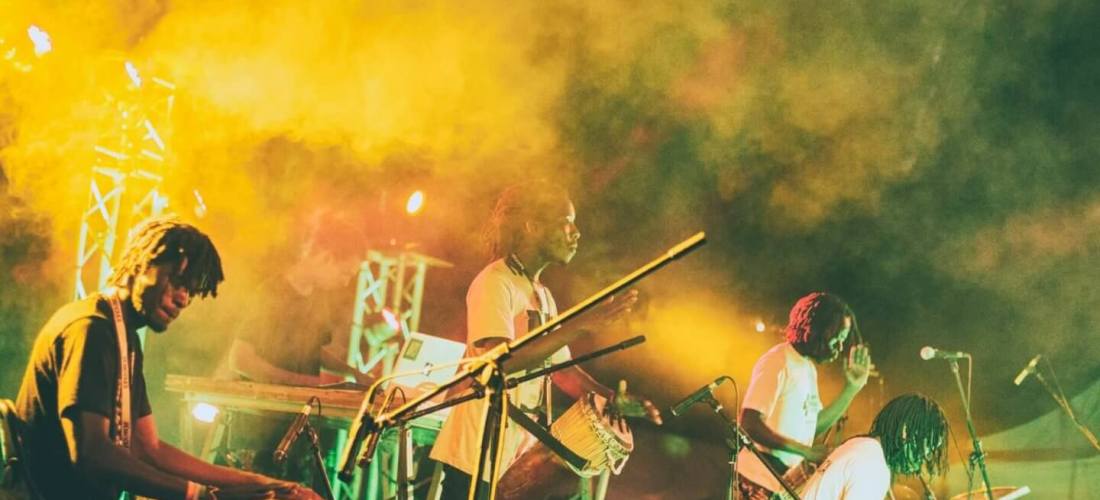With no other interviews available of him online, little information beyond his bios and Instagram and an incredible musical background, I didn’t know what to expect from my Skype call with Don Zilla.
Don Zilla, like the name alludes to, is the de-facto ‘Don’ of Ugandan label and festival Nyege Nyege and its more experimental offshoot Hakuna Kulala. He has become an in-house producer at Boutiq Studios in Kampala and has had a hand in the music that has made Kampala the incredible hub of forward thinking and genre defining music.
Don’s output has included a blistering two track EP ‘From the Cave to the World’ , a remix of SVBKVLT’s 33EMYBW, had a futuristic set at Nyege Nyege festival and has had a role in Villaelvin, involving Welsh artist Elvin Brandhi, Hakim and Swordman Kitala, in one of 2020’s best releases so far.

Image source: Bandcamp
With a dense imagination, he smashes together traditional African sounds with bass and experimental music to make his signature raw, relentless and often frightening sound, that feels like something the world isn’t ready for.
The prospect of my meeting with ‘The Don’ was an exciting opportunity to get to know the man behind the music, but that didn’t stop me from being slightly nervous.
However, once I began the Skype call and Don’s smooth, calming voice mixed with the serenity of his environment I could hear behind him, my whole perception of him had changed.
This conversation took place in early April, when Uganda was under one of the strictest lockdowns across Africa which is only now being eased. Travel was restricted to food shopping only and a strict curfew meant you had to be inside your house before 7pm.
Don was living in Kampala, near the Boutiq Studios, Don’s place of work and a go to place for much of Nyege Nyege and Hakuna Kulala’s talent such as Slikback, Nihiloxica and Ecko Bazz. Sadly the studio has been temporarily closed during the coronavirus, leading to delays for some future projects such as the highly anticipated Fulu Muzuki album.
But he was in good spirits given the circumstances and I could hear in the background a calm and natural environment full of birds and other sounds, indicating he was living in a peaceful environment during these far from peaceful times.
Since he was a child, Don had always dreamed of being a music producer, like a divine gift instilled to him as a child. It would be apt then that Don’s musical began in a church setting. His father was a priest and he first began playing drums in the church band before being invited Don to observe the church bands, which helped develop Don’s keen eye for music and the ability to absorb information, essential skills for a young, aspiring music producer.
With all of this knowledge, Don entered the outside world (or what his church called ‘The secular world’) and met other musicians first by observing their work and then participating himself as a band technician.
“I helped technicians, carrying equipment, organizing the stage. For me it was a new thing but I felt like now I am entering the field I want to be in”.
Years of working in the background, still driving towards that ultimate goal of being a music producer followed. Other music producers and musicians that Don had contacted were mostly willing to share and open up their knowledge for a young, enthusiastic producer but other times Don was met with hostility.
“Some people were greedy; they would not share their knowledge. Even those who had studios, I had to bribe them and pay money just to sit there and watch what they were doing”.
A stint in a band as a keyboardist followed but it wasn’t until 2014 that Don first encountered Nyege Nyege. At the time the label had yet to put out any releases and Nyege Nyege Festival had not yet started, but they were throwing parties in downtown Kampala under the name Boutiq Electronics.
“Whoever wanted to dance to a different kind of music would come and dance at these parties,” Don explains, affirming the party’s status as a hub for outsider musicians, looking for a place to discover new music.
The music played at these parties, leaning towards the more underground African dance music that didn’t get much airplay, but would later define the label such as kuduro and tarraxinha. This inspired Don or as he puts it “I got into the groove”.
“I’m not a person who is used to dancing. I would come, watch, listen and then learn,” continuing Don’s lifelong ability to absorb his surroundings and then store that knowledge for later use.
Things progressed over the years, leading to the inaugural festival in 2015 but it would still be a few years before Don would become fully involved with the label.
The fire within Don to produce music was burning even fiercer at this point but limited resources proved to be a hurdle. Undeterred, Don would continue with his dream and desire to produce music.
Don turned to FL Studio (widely used by African musicians and other musicians who lack big studio resources, highlighted in this recent brilliant history piece in DJ Mag), but without his own personal computer, Don relied on local internet cafes.
“I would pay for a certain time, download demos of FL studio and tried to work out something. At the end of the day, you had no way to save it as it was a demo. You would do a sketch but the next time you would come you find that the software has been deleted because they are not your computers. You have to push on”.
At this point, the Don Zilla of today really began to take shape, with him saving to buy musical equipment for his eventual dream of a music studio.
“I bought a soundcard, headphones and a microphone as my first equipment. Truthfully, I had no idea how those things worked or didn’t know where to start but I had the belief in me that I could do it.”
That soundcard would in-avertedly shape the rest of Don’s career and life, when Boutiq Studios needed a soundcard.
Boutiq Studios, opened by Nyege Nyege tapes in 2015, is more than just a recording studio. It’s a community space and a unique place in East Africa for talent to grow. Don describes the studios as “a united nations of artists”.

Don had lent the studio his soundcard for a few days and when he went to pick it up from the studio, he bumped into Derek Debru, co-director of Nyege Nyege. The two hadn’t met in a while and a conversation sparked up between the two, where Don shared his ideas and dreams about producing music. After the conversation Don sent a beat, which excited Derek very much. This led to an offer.
“Derek said ‘We have a studio here and there is not much going on. We have some issues with the producer. If you have time, you can always come around and do your thing’”. Soon after that, Don joined the studio and had finally got his space to develop himself as a producer.
He worked day and night, learning musical production software. Using these tools, he was able to lay down his own productions. “I couldn’t believe that I could be able to produce something like that”.
Don had cemented himself as a member of the Nyege Nyege family at this point, getting numerous gigs as a DJ around Kampala and working full time at the Boutiq Studio.
“It has been a very good experience for me as a person to see this journey coming from scratch to where I am today. I’m thankful for the people around me and I’m also thankful for life for allowing me to live and touch what my heart has always desired”.
But the journey for Don is far from over. His latest project Villaelvin features a collaboration with Welsh sound artist Elvin Brandhi. Elvin is a producer and sound artist from Bridgend who began as one half of father-daughter noise duo Yeah You.
Her signature sounds mostly involve found sound and field recordings, un-nerving vocals and a powerful, glitched out sound palette. Had she been born in East Africa as opposed to Wales; she would have immediately gravitated towards the Nyege Nyege label.
The project first began thousands of miles away from Don’s home in Uganda, at a nightclub in Berlin. One of the Nyege Nyege directors was playing a DJ set, with Elvin in attendance, when he dropped Don’s track ‘From the Cave’.
“He played that sound and people went mad. He told me he has never seen anything like that in his entire life of being a DJ,” Don proudly tells me. “It was like a possession.”
Elvin in the crowd and was amazed that the sound was being produced in Africa. Her interest led her on a journey to find the source of the sound and the master behind it. A trip to Kampala in April last year was soon arranged.
“By the time she came to Kampala, she already knew who I was, but I didn’t know who she was. That was funny and weird to me,” Don chuckles.
Despite their different backgrounds, the pair immediately got along like kindred spirits. Don described it as “being on the same frequencies”. They bonded over their love of this new and exciting sound coming from Uganda.
The pair began collaborating, taking found sounds recorded at Don’s church as their main source of inspiration and combining it with Elvin’s ghostly vocals and Don’s signature warped, futuristic sounding percussions. The result was new album ‘Headroof’ released earlier this year on Hakuna Kulala, the first full LP released on the label.

Image source: News Break
“I didn’t actually think it was going to be released,” Don recalls. “It was very serious but at the same time we were playing around. It was like playing a game”.
This album will hopefully be seen as a start of a great deluge of creative output from Don Zilla, as a full-length LP under his own name is set to be released in the near future. The album has been in the works since 2018’s ‘From the Cave to the World’.
“An EP is like an introduction. So for people to fully get to know you, you have to do something bigger than you have done before”.
The album is in the final stages of production, “with only one project on the album giving me a headache” as Don puts it. You can see why delays could inevitably happen with the very careful nature that Don puts into his work. “Most of my music I think so much. I think to an extent that people get irritated!”.
Tapping into the ‘spiritual’ and ‘dimensional’ nature of his music is something he is devoted to, leading to the thoroughness in his work. “I take a long time because you need to tap into those dimensions to bring out the message you want to bring out”.
The topic of conversation inevitably turns to the COVID-19 pandemic. Don gave his own thought-provoking assessment on the pandemic.
“All of this came to us as a test to humanity. It doesn’t matter who you are, where you’ve come from, it has come to test us. It has happened because at one-point people were very careless with mother nature”.
The lockdowns across the world have blighted the music industry, arguably the most blighted of sectors around the world. Nyege Nyege is no different, with gig cancellations for much of the artists and the much adored Nyege Nyege festival looking more and more in jeopardy the longer we go on without any real solutions.

Image source: AllAfrica
Unlike in the UK where the Arts Council has provided emergency support for music artists in the UK, such financial support doesn’t exist within Uganda or many other parts of Africa.
“[In some cases] we are not cared for as much as artists in some parts of the world. If you are an artist [in Africa] and you don’t work hard to have something that you can depend on, life will become hard on you,” Don tells me. “We just have to be prepared with life and try to work hard in different ways not only in music, but to give you income to at least shield you in times like these”.
Don knows all too well about tests in life, spending years building towards his dream and finally achieving his goals. There is a lot to learn from Don’s journey, that we ourselves can apply in times when all seems hopeless within the world.
“There is nothing to do but stay focused and think bigger than we have been thinking and go on with life. Life still goes on and life is still good”.
Listen to our interview with Don Zilla on Reform Radio’s Mixcloud:





